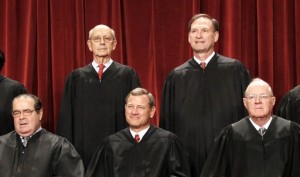Like death and taxes the conundrum of short term advantage versus long term gain is always with us, in public as well as private life. Somehow, just now, it seems to be more than usually evident in political-economic decisions before The Republic.
Here are two:
The Supremes, as I write, are off deciding what to do about President Barack Obama’s principal policy “achievement”, his attempt to restructure American health institutions. In addition to their intimate connection to every citizen’s person, health costs constitute a sixth of the economy — growing faster than the macroeconomy, even were it to climb out of its present malaise. If you are of a certain age, and going to physicians more often than you thought you ever would, you know exactly why.

You watch, in dismay if you are a Great Depression Offspring, at the frantic ripping open with complete abandon of always additional packages of sterile paraphernalia. [What ever happened to physicians washing hands at frequent intervals?] Or you submit like a lamb to slaughter to one more new “test” demanding high-priced digital equipment and increasingly more expensively trained technicians.
To meet this price challenge, Mr. Obama’s Gordian Knot stroke was a minor catastrophe — a hapless 2,700-page document, written by our new breed of fashionable, blow-dried-coiffed, short-time, revolving Congressional aids who long ago replaced the Bourbon-and Branch-Water veterans versed in arcane legislation. They did not abdicate their role to bureaucrats and their “regs”. What logically was required was patient [pun intended!] incremental reform of a gigantic problem — for example, using the Constitution’s much debated commerce clause to create a national market eliminating current conspiratorial state monopolies in health insurance.
But should the nine simply strike down the measure, limiting themselves to judging its constitutionality? That would cause an immediate disaster, for though the law was intended to kick in slowly, it has already created a tsunami of economic as well as political unintended consequences. Should the Court ignore for whatever reason Congress not having written in a severability clause inoculating the legislation from a stricture on particular aspects voiding the rest? If the Court, come mid-summer in the sweating welter of the presidential campaign, announces striking down only the patently unconstitutional, generally detested mandate for forced purchase of insurance by the non-insured, it in effect would be helping to write legislation by preserving the law’s other parts. That, certainly, violates the spirit of separation of powers, legislative, executive and judicial — the essence of U.S. political genius, so much now imitated by regimes aspiring to democracy the world over.
Equally demanding our attention — at the pumps if not in our grander political vision — is energy, the foundation of all American economic life. True enough, the president — despite it being used as a political machete as it was against his predecessors — can do little immediately about the gasoline price itself. It is, as his claque maintains, a result of many unfortunate forces coming together — not the least his meandering policy for dealing with the threat of weapons of mass destruction in the hands of the fanatics leading hugely oil producing Iran.
But the Obama administration’s stubborn pursuit of policies limiting production from North American reserves of fossil fuel, by far the largest in the world, is contributing to the overall medium term rising cost of energy [even when adjusted for a devaluing dollar]. If the celebrated “all of the above” strategy to produce additional energy from whatever sources to which the President says he subscribes were his net policy, it would have enormous psychological impact on markets. He could, for example, block restrictions on coal by the Environmental Protection Agency which if carried through would curtail the 40 percent of electricity it now generates. He could open government lands for new drilling.
In riposte, younger technocratically-inclined Saudi princes and their Persian Gulf co-autocrats’ advisers would understand they do, indeed, sit on a diminishing resource and would start pumping at maximum levels. For despite ineffective political barriers — the growing sanctions against Iranian oil or Venezuelan demagogue-in-chief Hugo Chavez’ flirtations with China and his fellow dying ideological buddy Cuba’s Fidel Castro — the world petroleum market is “fungible”. In other words, Washington’s pursuit of “drill, baby, drill!” would increase the world‘s total energy availability and diminish market speculation on future higher oil prices, helping lift an onerous burden for the currently strapped American commuter.
Sol W. Sanders, (solsanders@cox.net), writes the ‘Follow the Money’ column for The Washington Times on the convergence of international politics, business and economics. He is also a contributing editor for WorldTribune.com and East-Asia-Intel.com.


You must be logged in to post a comment Login